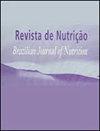The “Comida de República” web-based course to promote healthy eating among college students
IF 0.6
4区 医学
Q4 NUTRITION & DIETETICS
Revista De Nutricao-brazilian Journal of Nutrition
Pub Date : 2021-07-02
DOI:10.1590/1678-9865202134e200016
引用次数: 1
Abstract
ABSTRACT Objective The work aimed to investigate dietary practices of university students after an action aiming to promote adequate and healthy food. Methods The article reports the experience of the distance education course Comida da República, promoted by the Universidade Federal de São Paulo as an educational space for sharing and exchanging knowledge, experiences, and thoughts on eating in the university context, especially in student homes or fraternities (repúblicas). Online questionnaires assessed the profile of participants and changes in their perception or relationship with food. The Students’ t-test was adopted to compare perceptions before and after the intervention, and content analysis for qualitative data. Results The course had 201 students enrolled and 82 who concluded it, with 35.4% living in repúblicas. Before the course, 89.6% of those who completed the course indicated the need to improve their diets, and 57.3% classified their diets as “regular”. There was a significant change in perception after the course: 58.5% of those who completed it rated their food as “good”. Dietary changes were categorized into two themes: “vision on food production and distribution” and “food and meal consumption”. The emerging codes show a greater awareness and criticism about food systems and a greater appreciation of cooking, commensality, and unprocessed and minimally processed foods. Participants identified environmental, personal, and interpersonal barriers (67.1%) to dietary changes. The course emerged as a facilitator of these changes. Conclusions This intervention proved to be an important educational tool to promote adequate and healthy eating, in addition to contributing to the planning and execution of student affairs and food security policies.“Comida de República”网络课程旨在促进大学生健康饮食
【摘要】目的了解大学生在开展足量健康饮食活动后的饮食习惯。本文报告了远程教育课程Comida da República的经验,Comida da República是由圣保罗联邦大学(universsidade Federal de spaulo)推广的,作为在大学背景下,特别是在学生家庭或兄弟会中分享和交流关于饮食的知识、经验和思想的教育空间(repúblicas)。在线问卷评估了参与者的概况以及他们对食物的看法或关系的变化。采用学生t检验比较干预前后的认知,并对定性数据进行内容分析。结果本课程共招收学生201人,结业82人,居住在repúblicas的学生占35.4%。在课程开始前,89.6%的完成课程的人表示需要改善他们的饮食,57.3%的人将他们的饮食归类为“常规”。课程结束后,人们对食物的看法发生了显著变化:58.5%的人认为自己的食物“不错”。饮食变化分为两个主题:“对粮食生产和分配的展望”和“食品和膳食消费”。新出现的准则表明,人们对粮食系统有了更大的认识和批评,对烹饪、共生、未加工和最低限度加工食品有了更大的欣赏。参与者认为饮食改变的环境、个人和人际障碍(67.1%)。这门课程成为这些变化的推动者。结论:除了有助于学生事务和食品安全政策的规划和执行外,该干预措施被证明是促进充足和健康饮食的重要教育工具。
本文章由计算机程序翻译,如有差异,请以英文原文为准。
求助全文
约1分钟内获得全文
求助全文
来源期刊
CiteScore
1.20
自引率
12.50%
发文量
24
审稿时长
6-12 weeks
期刊介绍:
Revista de Nutrição is former Revista de Nutrição da Puccamp, founded in 1988. It is a bimonthly publication every four months and it is of responsibility of the Centro de Ciências da Vida, da Pontifícia Universidade Católica de Campinas . It publishes articles that contribute to the study of Nutrition in its many sub-areas and interfaces; and is open to contributions of the national and international scientific communities.

 求助内容:
求助内容: 应助结果提醒方式:
应助结果提醒方式:


